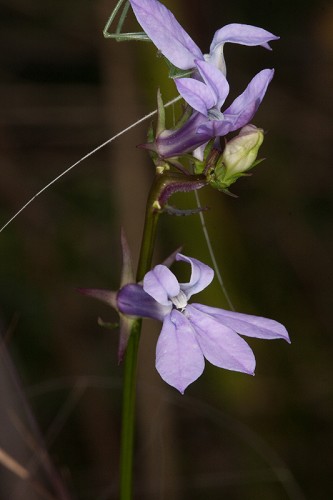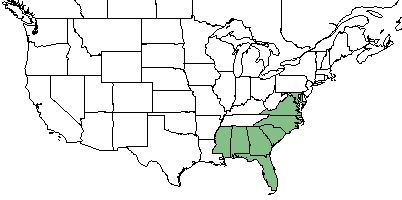Lobelia glandulosa
Common name: Glade lobelia[1]
| Lobelia glandulosa | |
|---|---|

| |
| Photo by the Southeastern Flora Database | |
| Scientific classification | |
| Kingdom: | Plantae |
| Division: | Magnoliophyta - Flowering plants |
| Class: | Magnoliopsida - Dicots |
| Order: | Campanulales |
| Family: | Campanulaceae |
| Genus: | Lobelia |
| Species: | L. glandulosa |
| Binomial name | |
| Lobelia glandulosa Walter | |

| |
| Natural range of Lobelia glandulosa from USDA NRCS Plants Database. | |
Contents
Taxonomic Notes
Synonyms: none.[2]
Varieties: none.[2]
Description
L. glandulosa is a perennial forb/herb of the Campanulaceae family native to North America.[1]
Distribution
L. glandulosa ranges from eastern North Carolina to southern Florida, and west to southern Alabama.[2]
Ecology
Habitat
L. glandulosa is found in seepage slopes, pitcher-plant bogs, streamhead margins, pine savannas, flatwoods, and margins of beaver ponds.[3] Specimens have been collected from cypress palm palmettos in sandy peat of cypress dome, low swamp, wiregrass bog, mixed hardwood, wiregrass savanna, pine flatwoods, and edge of limesink pond.[4]
Lobelia glandulosa is an indicator species for the Calcareous Savannas community type as described in Carr et al. (2010).[5]
Phenology
L. glandulosa flowers from September to October.[2]
Use by animals
The Twin-spot Skipper (Oligoria maculata) has been observed on this species.[6]
Conservation, cultivation, and restoration
L. glandulosa is listed as endangered/extirpated by the Maryland Department of Natural Resources Natural Heritage Program.[1]
Cultural use
Photo Gallery
References and notes
- ↑ 1.0 1.1 1.2 USDA Plant Database https://plants.usda.gov/core/profile?symbol=LOGL
- ↑ 2.0 2.1 2.2 2.3 Weakley, A.S. 2015. Flora of the southern and mid-atlantic states. Working Draft of 21 May 2015. University of North Carolina at Chapel Hill, Chapel Hill, North Carolina.
- ↑ Weakley, A. S. (2015). Flora of the Southern and Mid-Atlantic States. Chapel Hill, NC, University of North Carolina Herbarium.
- ↑ URL: http://herbarium.bio.fsu.edu. Last accessed: June 2018. Collectors: R. Kral, S.C. Hood, C. Jackson, R.K. Godfrey, Loran C. Anderson, Ann F. Johnson, Nancy Edmonson, Sidney McDaniel, K. Craddock Burks, Christopher Campbell, Robert Lazor, John B. Nelson, R. H. Wnek, John Morrill, Sara J. Noyes, P. Denelle, G. Fleming, O. Lakela, R. R> Smith, T. Myint, A. F. Clewell, Robert Blaisdell, George R. Cooley, R. J. eaton, J. D. Ray, R. W. Long, Wm. G. Atwater, R.A. Norris, R. Komarek, R.L. Wilbur, F. G> Tarbox, O.M. Freeman, Harry E. Ahles, S.L. Orzell, E.L. Bridges, P. Sheridan, Frankie Snow. States and counties: Florida (Martin, Okaloosa, Liberty, Bay, jackson, Bay, Santa Rosa, Franklin, Leon, Gadsden, Liberty, Sarasota, Nassau, Calhoun, Wakulla, Taylor, Levy, Lafayette, Madison, Hernando, Volusia, Okaloosa, Okeechobee, Citrus, Putnam, Charlotte, Collier, Union, Martin, Hillsborough, Dade, Pasco, Dixie, St. John) South Carolina (Jasper, Horry, Berkeley) Alabama (houston, Russell) Georgia (Thomas, Emanuel, Clinch, Atkinson, Grady)
- ↑ Carr, S.C., K.M. Robertson, and R.K. Peet. 2010. A vegetation classification of fire-dependent pinelands of Florida. Castanea 75:153-189.
- ↑ Observation by Edwin Bridges in Polk County Fl., comment by E. Michael Powell and Linda Cooper, November 16, 2016, posted to Florida Flora and Ecosystematics Facebook Group.